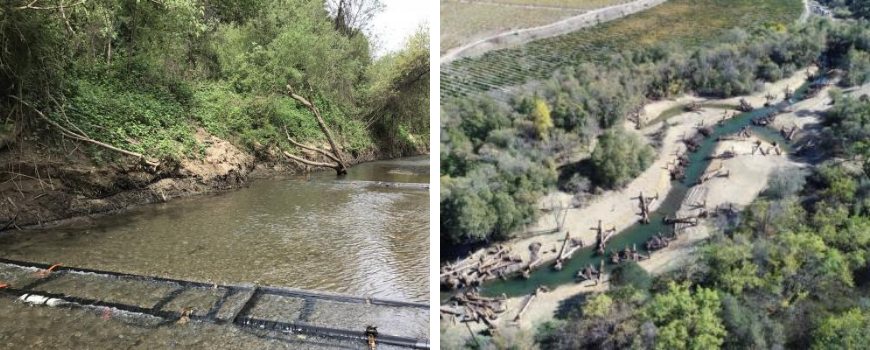
Drought, Fire, and Floods—Can Salmon and the Restoration Field Adapt?
Join California Sea Grant's Russian River Salmon and Steelhead Monitoring team for workshops and tours during the 37th Annual Salmonid Restoration Conference.
The conference agenda will explore a range of issues including foodscapes, floodplains, and freshwater-estuarine habitats; monitoring, modeling and strategies to address summertime flows; salmon-habitat relationships, Spring-run Chinook genetic and recovery issues as well as Klamath River dam removal planning.
Tours
PIT Antenna Technology: An Array of Applications in the Russian River Watershed
April 23, 2019 9:00am - 5:00pm
Tour Coordinators:
Will Boucher, California Sea Grant
Gregg Horton, Sonoma County Water Agency
Passive integrated transponder (PIT) antennas have become important tools for informing salmonid habitat and demographic questions. We will provide an overview of advancements in PIT technology that have expanded our capabilities for answering questions that up until now could not readily be addressed with traditional monitoring methods. We will show examples of how we are using PIT antennas for life cycle monitoring, movement, survival, habitat validation, habitat connectivity, and growth in a variety of habitats: Russian River estuary and mainstem, Dry Creek, Green Valley Creek and Porter Creek. Matching PIT antenna and reader configurations to monitoring objectives are important considerations in developing a sound monitoring plan. By strategically siting antenna locations to complement other more traditional sampling approaches, we have developed a robust monitoring program that is less vulnerable to data inconsistencies arising from environmental extremes. At the same time, we can drill-down on critical habitat issues that are impeding population recovery.
Dutch Bill Watershed Streamflow Improvement and Coho Recovery Tour
April 24, 2019, 9:00am - 5:00pm
Tour Leaders:
John Green, Gold Ridge RCD
Sarah Nossaman, California Sea Grant
Mia van Docto and Mary Ann King, Trout Unlimited
This full-day field tour will focus on Dutch Bill Creek Watershed, considered to be one of the most critical watersheds for the recovery of endangered Coho salmon and steelhead in the lower Russian River watershed. For two decades there have been a comprehensive suite of strategies utilized by multi-stakeholder to restore this watershed from ridgeline to rivermouth.
Exploring a Stage Zero Valley - Aggraded, Avulsed, Restored
Willow Creek, a tributary to the Russian River's estuary, has a 2-mile long low gradient alluvial valley that had been managed for drained and irrigated agricultural land for over 100 years. Over the last 30-year period it transformed itself from an incised single-thread channel into a wetland channel complex through channel aggradation and multiple avulsions. This transformation helped inspire Cluer and Thorne's development of the Stream Evolution Model and the concept of Stage 0 channels. In 2011 the fish passage barrier in the lower valley was removed. Coho and steelhead immediately navigated through the multi-threaded wetland channels and returned to the upper watershed to spawn. Coho numbers and migration patterns in the watershed have been monitored by California Sea Grant's Russian River Salmon and Steelhead Monitoring Team since 2011.
Sessions
Summertime Blues: Salmonid Survival and Ecosystem Response at the Base of the Hydrograph
April 26, 2019, 9:00am - 12:00pm
Session Coordinators:
Mariska Obedzinski and Sarah Nossaman, California Sea Grant
Flow impairment has been recognized as a bottleneck to salmon recovery in many of California’s coastal stream systems, but we still have much to learn about the specific variables that drive juvenile salmonid condition and survival in intermittent streams, where average daily flow can persist in just tenths to hundredths of a cubic foot per second over the dry summer months. This session will focus on current scientific research investigating environmental and biological responses to changes in streamflow at the low end of the hydrograph. Collectively, this work contributes to a better understanding of the effects of flow impairment on salmonids and the habitat on which they depend, in order to support effective management of our limited water resources.
- Impacts of Low Summer Streamflow on Salmonids Rearing in Russian River Tributaries
Mariska Obedzinski, California Sea Grant - Dynamics That Influence Dissolved Oxygen Concentrations in Salmonid Rearing Pools and Possible Implications for Management
Sarah Nossaman, California Sea Grant and Bryan McFadin, North Coast Regional Water Quality Control Board
Strategies for Improving Streamflow
April 26, 2019, 1:00pm - 5:00pm
Session Coordinators:
Matt Clifford, Trout Unlimited, California Water Project
Sarah Nossaman, California Sea Grant, Russian River Salmon & Steelhead Monitoring Program
Insufficient oversummer streamflow is a significant limiting factor to salmonid recovery in many of coastal California’s intermittent streams, including several of the highest priority coho salmon streams in the Russian River watershed. The long-term impacts of drought, anthropogenic water use and landscape-scale changes, as well as local groundwater dynamics and environmental factors, must be considered when developing effective strategies for flow improvements. This session will focus on practical and innovative approaches to enhancing summer streamflow. Possible topics include (but are not limited to) collaborative and watershed-scale efforts that address this complex issue, strategies for setting and achieving flow targets, challenges and techniques associated with effective project implementation, guidance on navigating the permit process and water rights laws, and efforts to include groundwater dynamics and other environmental factors in project development.
- Just Add Water: an Overview of Small-scale Flow Releases and Monitoring Tools to Support Salmonid Recovery in the Lower Russian River Basin
Elizabeth Ruiz, California Sea Grant